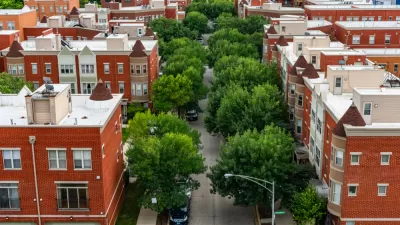The doomed effort was Mayor London Breed's third attempt to streamline development in the city.

A charter amendment to streamline development that San Francisco Mayor London Breed proposed for consideration by voters died in a Board of Supervisors committee, reports J.D. Morris for the San Francisco Chronicle (paywall).
The proposed charter amendment "sought to streamline new housing construction by letting some qualified projects circumvent the city’s discretionary review process, cutting a year or two from a timeline that can take two years or more for developers to complete," explains Morris.
"The amendment would have applied to housing projects with more than 25 units, requiring market-rate developers to build 15% more affordable homes than San Francisco normally requires. All 100% affordable housing projects would have been subjected to the amendment’s provisions," adds Morris.
This was the third failed attempt to streamline San Francisco's development approval process since 2019.
Supervisors Aaron Peskin and Connie Chan were responsible for the most recent demise of the amendment. "Peskin, the committee’s chair, said that the proposal had not been vetted properly with the various community stakeholders it would affect and that after hearing strong concerns from a chorus of opponents, it would be futile to advance the amendment," according to Morris.
Mayor Breed responded to the defeat on Twitter, writing: "San Francisco had a chance to make the most significant change in decades to how we build housing in this City. But it was rejected by the Board of Supervisors."
A Twitter post by University of California, Davis Law Professor Chris Elmendorf explains that the decision to reject the amendment might run afoul of state law. "There's now a strong body of evidence that SF's permitting process is an egregiously bad outlier relative to every other jurisdiction that that's been studied," writes Elmendorf while referencing research published by SSRN in November 2021.
FULL STORY: Mayor Breed’s push to streamline housing production killed by supervisors

Maui's Vacation Rental Debate Turns Ugly
Verbal attacks, misinformation campaigns and fistfights plague a high-stakes debate to convert thousands of vacation rentals into long-term housing.

Planetizen Federal Action Tracker
A weekly monitor of how Trump’s orders and actions are impacting planners and planning in America.

San Francisco Suspends Traffic Calming Amidst Record Deaths
Citing “a challenging fiscal landscape,” the city will cease the program on the heels of 42 traffic deaths, including 24 pedestrians.

Defunct Pittsburgh Power Plant to Become Residential Tower
A decommissioned steam heat plant will be redeveloped into almost 100 affordable housing units.

Trump Prompts Restructuring of Transportation Research Board in “Unprecedented Overreach”
The TRB has eliminated more than half of its committees including those focused on climate, equity, and cities.

Amtrak Rolls Out New Orleans to Alabama “Mardi Gras” Train
The new service will operate morning and evening departures between Mobile and New Orleans.
Urban Design for Planners 1: Software Tools
This six-course series explores essential urban design concepts using open source software and equips planners with the tools they need to participate fully in the urban design process.
Planning for Universal Design
Learn the tools for implementing Universal Design in planning regulations.
Heyer Gruel & Associates PA
JM Goldson LLC
Custer County Colorado
City of Camden Redevelopment Agency
City of Astoria
Transportation Research & Education Center (TREC) at Portland State University
Jefferson Parish Government
Camden Redevelopment Agency
City of Claremont





























